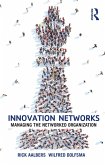The book goes behind the innovation frenzy characterizing society today. It brings attention to the commercial waste, policy ineffectiveness and human suffering caused by the way corporations have executed and policy makers have regulated innovation. It emphasizes the unexploited opportunities of approaches that consider also long term and undesirable consequences of innovation.
Dieser Download kann aus rechtlichen Gründen nur mit Rechnungsadresse in A, B, BG, CY, CZ, D, DK, EW, E, FIN, F, GR, HR, H, IRL, I, LT, L, LR, M, NL, PL, P, R, S, SLO, SK ausgeliefert werden.









